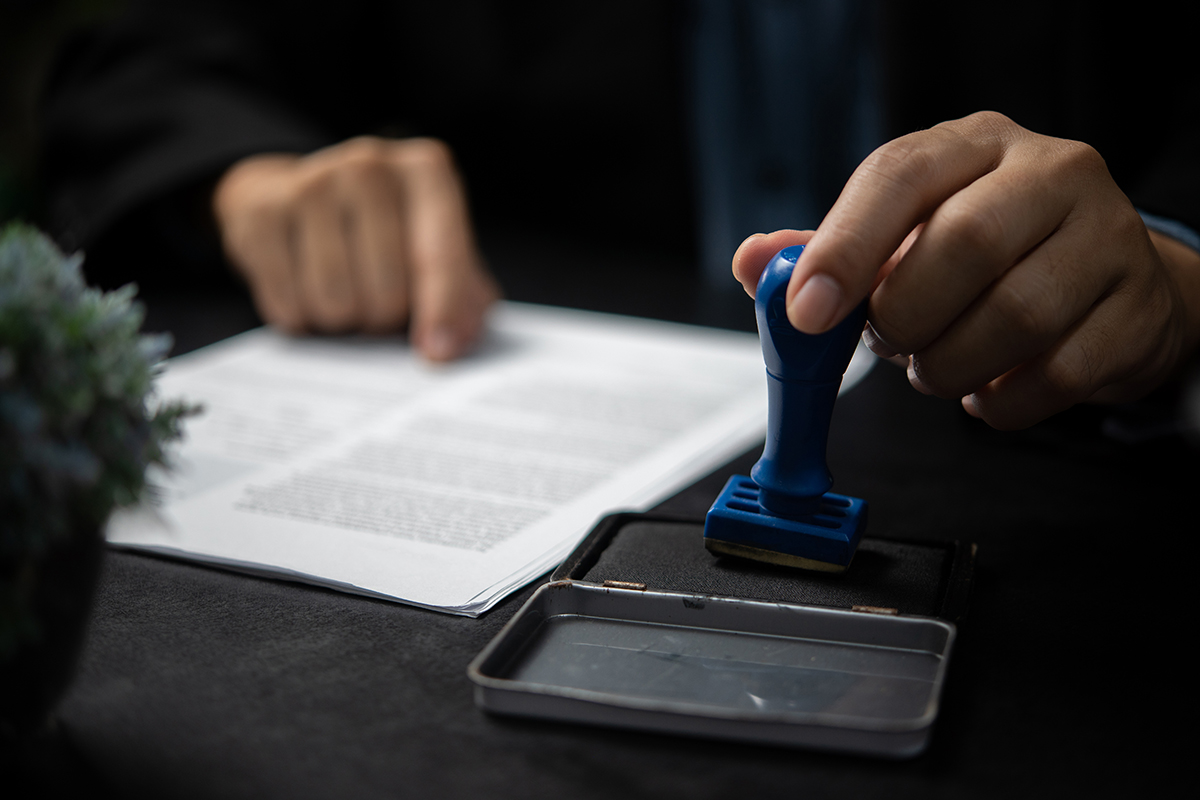Often, situations arise where you cannot personally collect or claim valuable items or documents due to their unavailability. In such instances, it is easier to designate someone else to fulfill these functions on your behalf. This is possible through an authorization letter to claim. The primary purpose of it is to give formal permission for someone else to claim or handle something on your behalf. As such, it can be used in various scenarios, including picking up mail, collecting legal and official documents (such as passports or IDs), receiving parcels, withdrawing funds from an account, or handling administrative tasks.
This article will educate you on how this letter operates in facilitating the claiming of items or documents. It will provide a comprehensive guide that delves into the step-by-step process of crafting it, encompassing its fundamental components.
It is a legal document that gives another individual the authority to undertake actions and collect something on your behalf. Typically, it is written when you are unable to collect the item yourself due to reasons such as being away from your residence country or lacking physical mobility due to a medical condition. The letter should specify the authorizer or principal (you) and the authorized party.
The person you authorize is often referred to as your “agent,” “representative,” or “attorney-in-fact”, depending on the context. Also, it must give explicit authority (scope, duration, and instructions) and describe the item being claimed in detail. This could be anything from picking up a package, retrieving documents, or collecting payments. It is a communication tool that informs the recipient of your intention to convey the authorization and also serves as a formal record of the arrangement.
Sample Letters
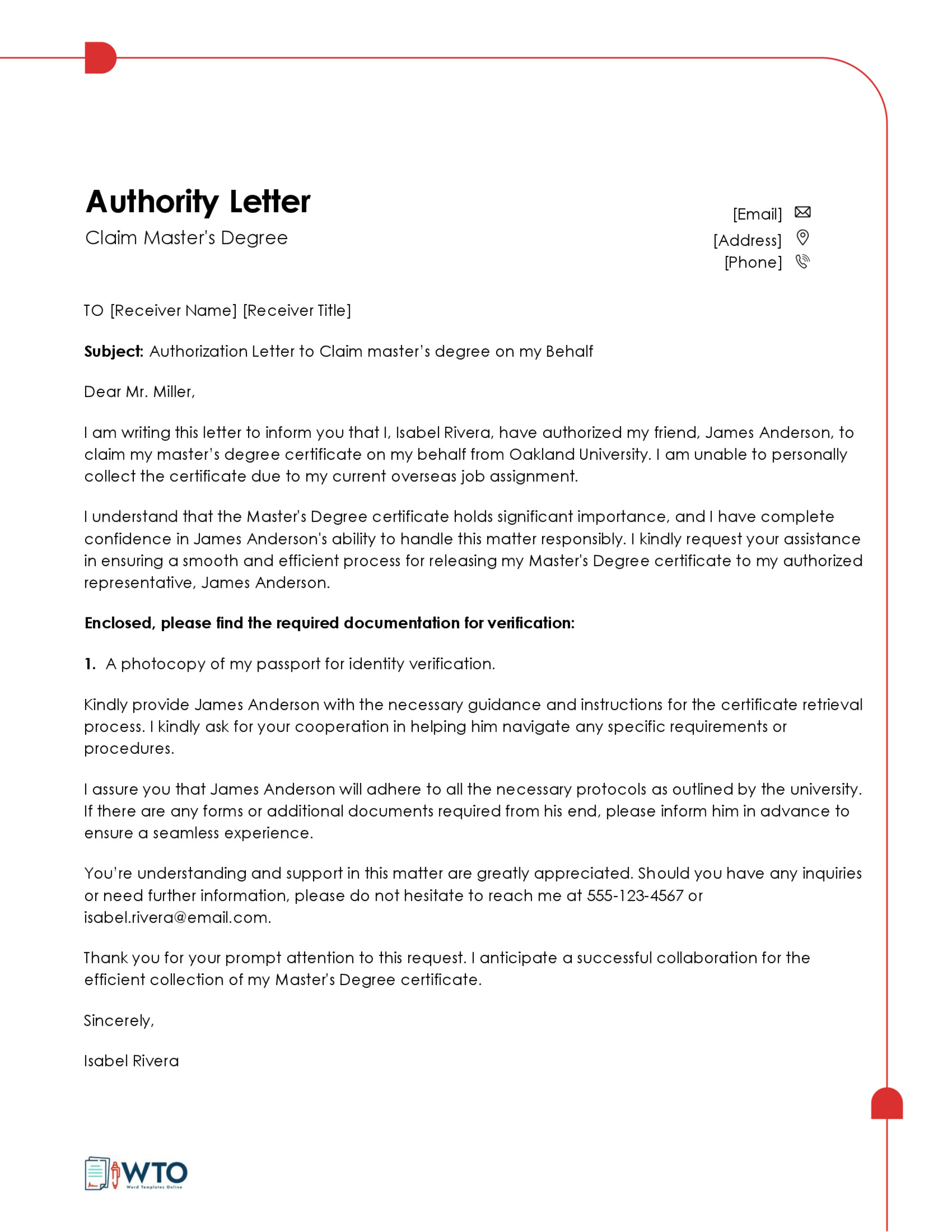
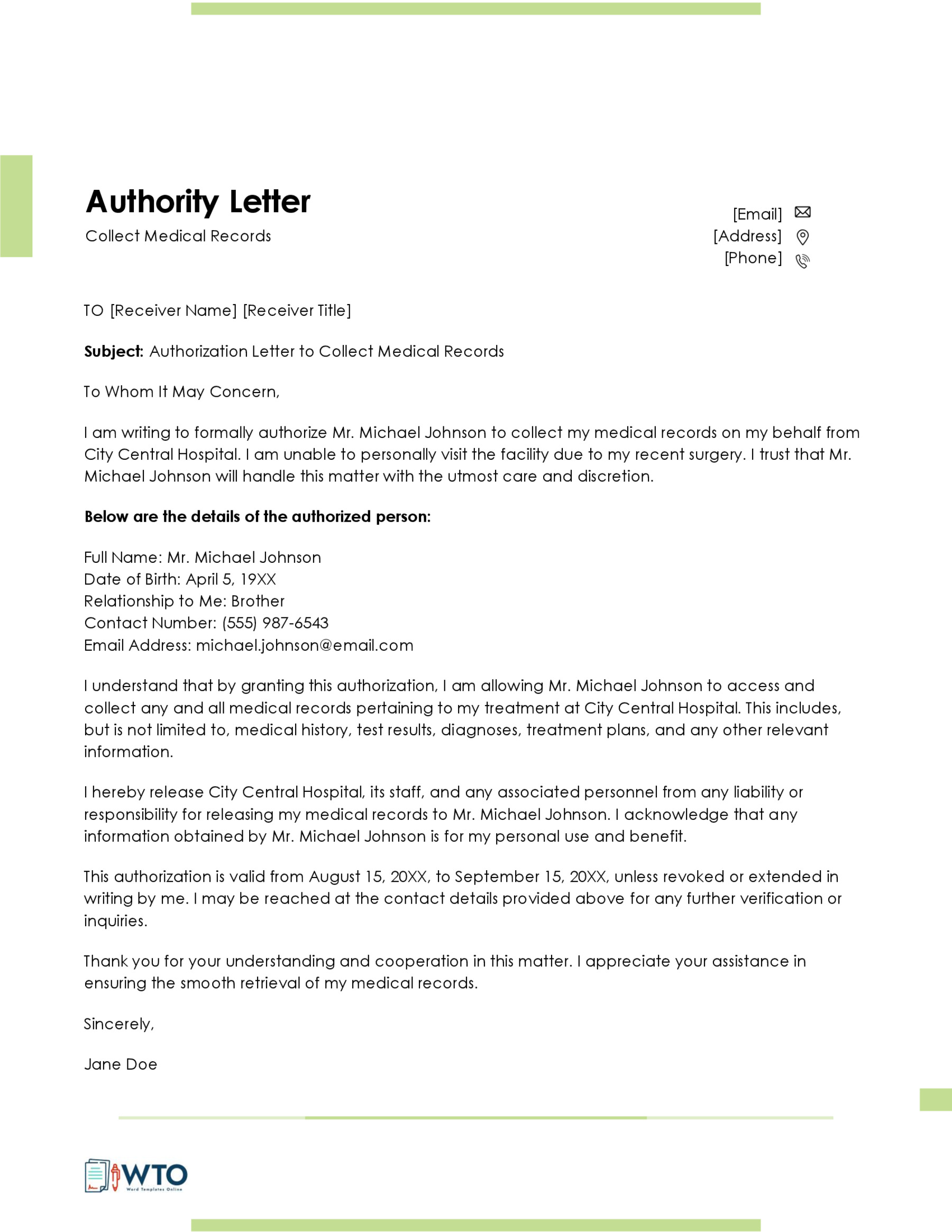
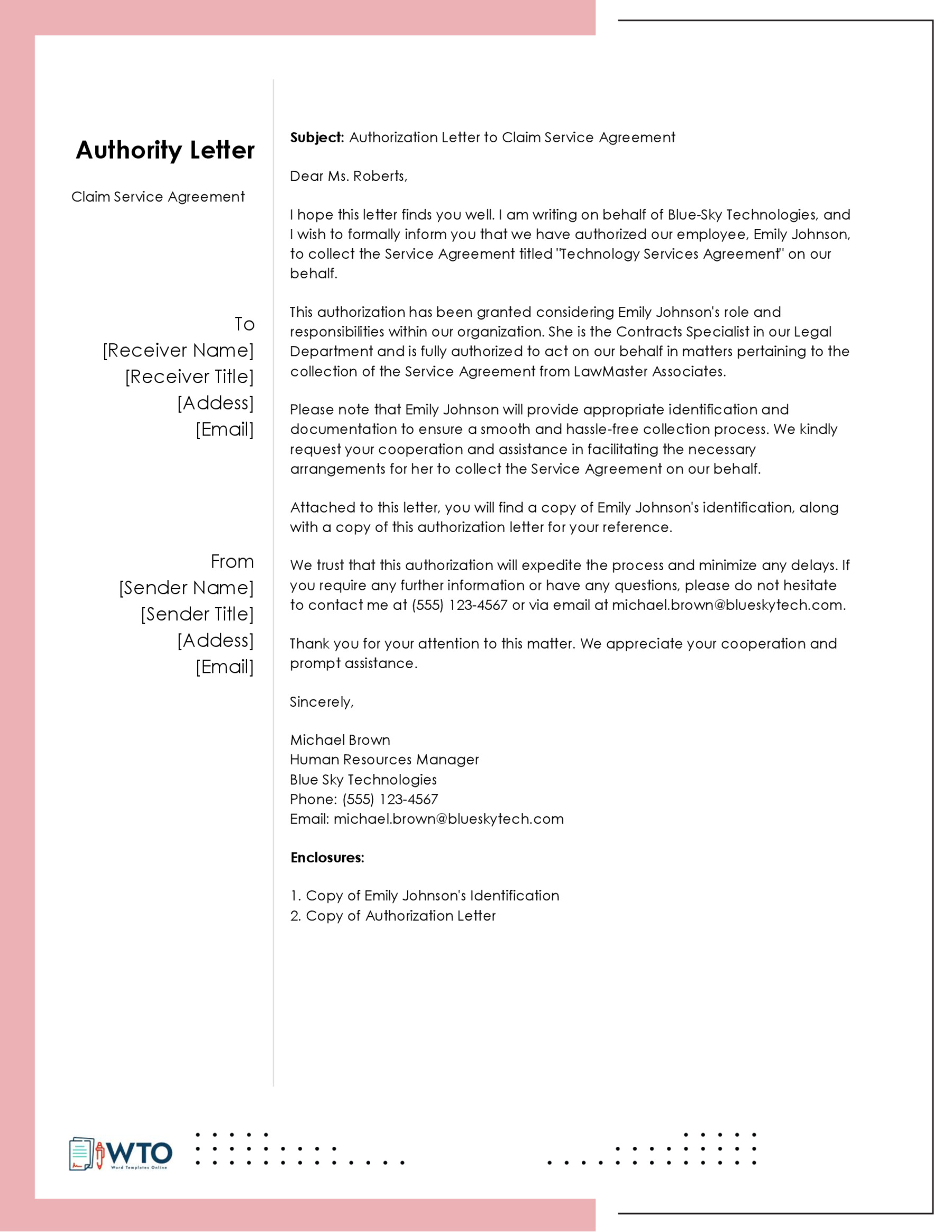
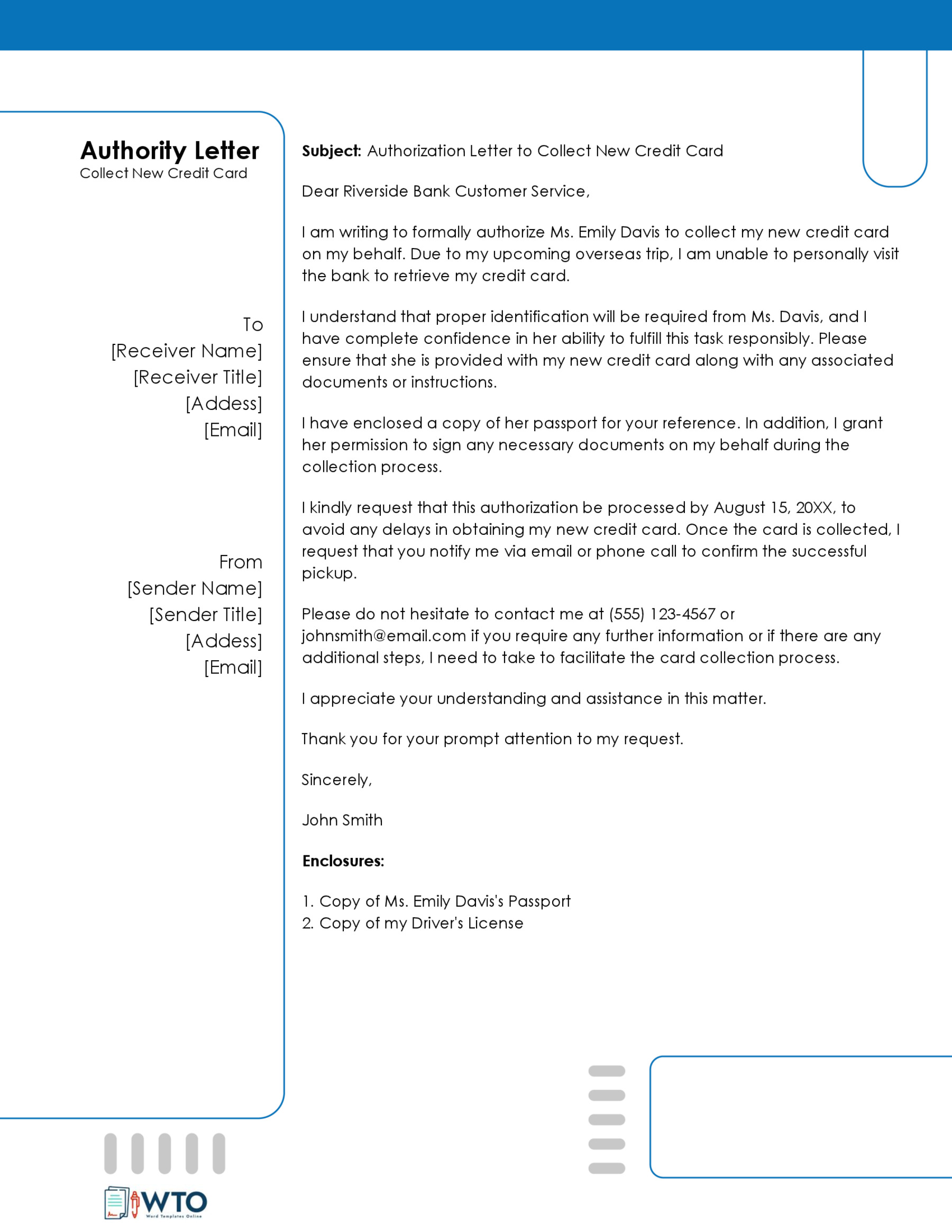
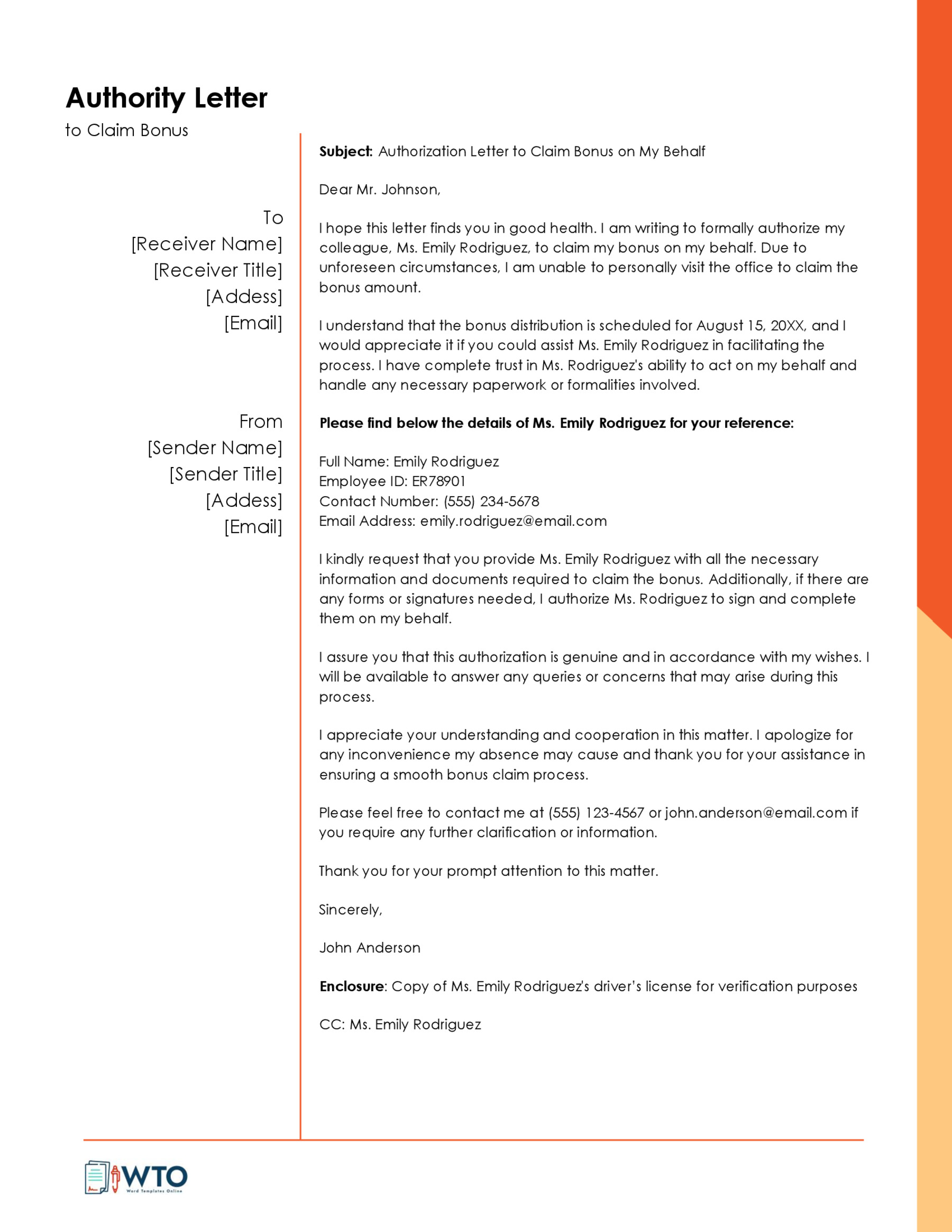
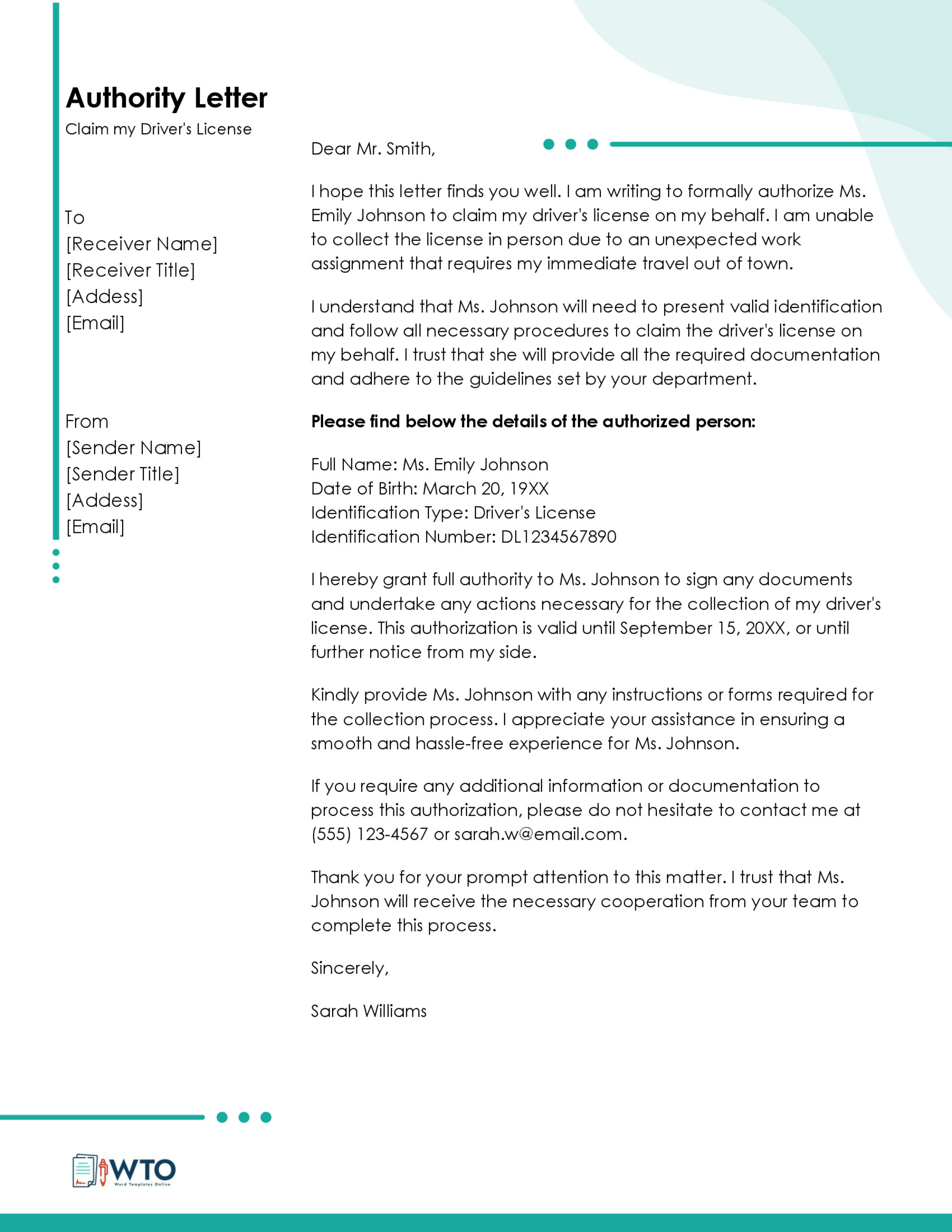
Templates
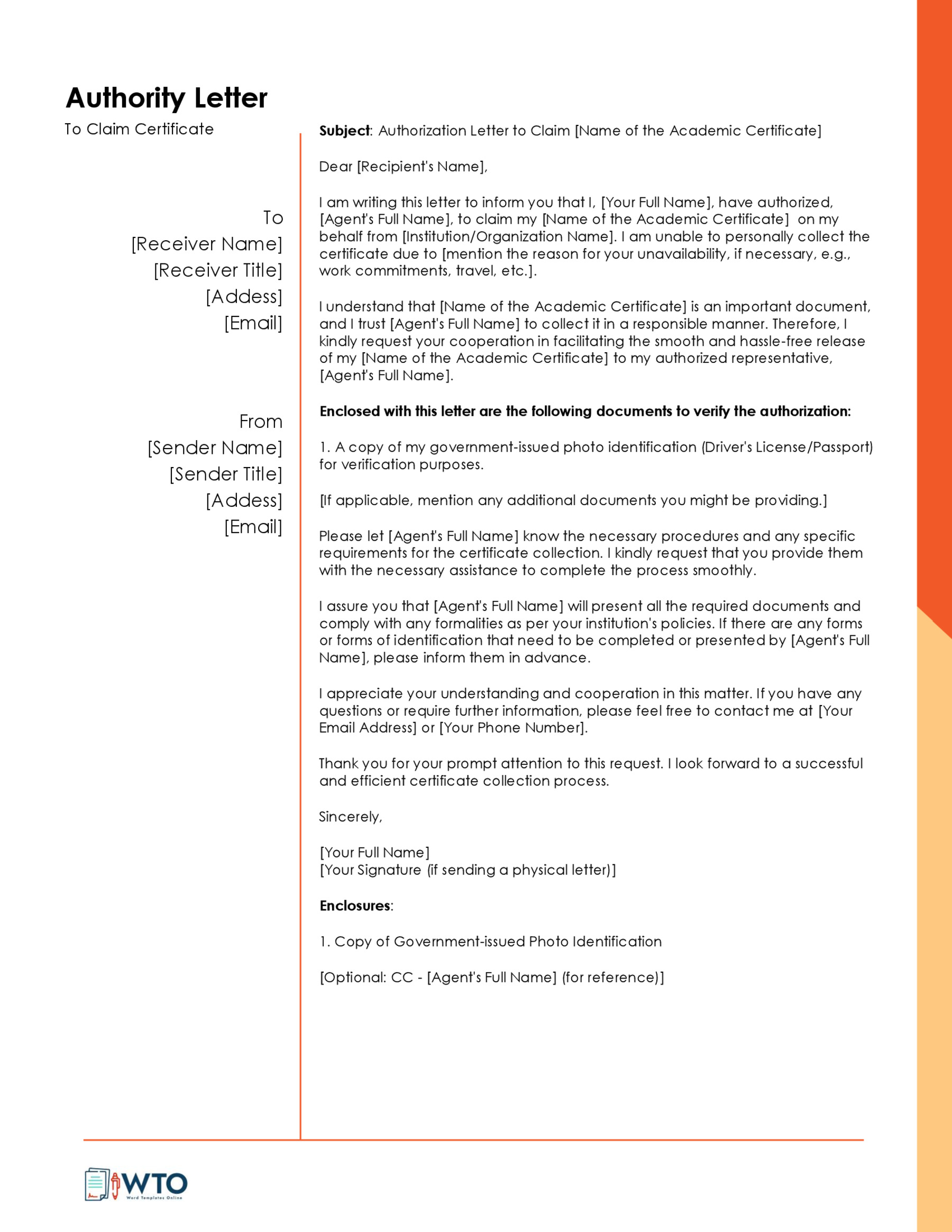
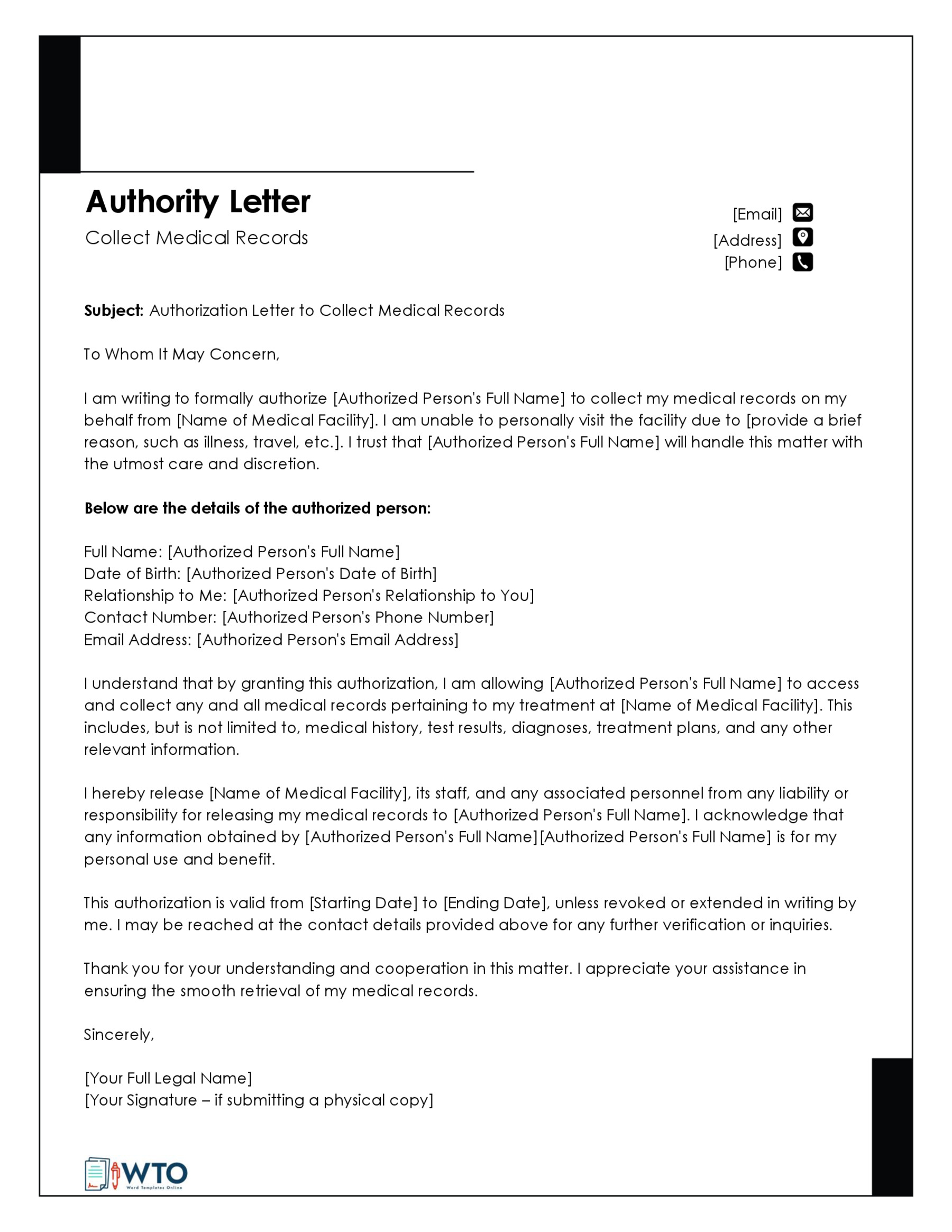
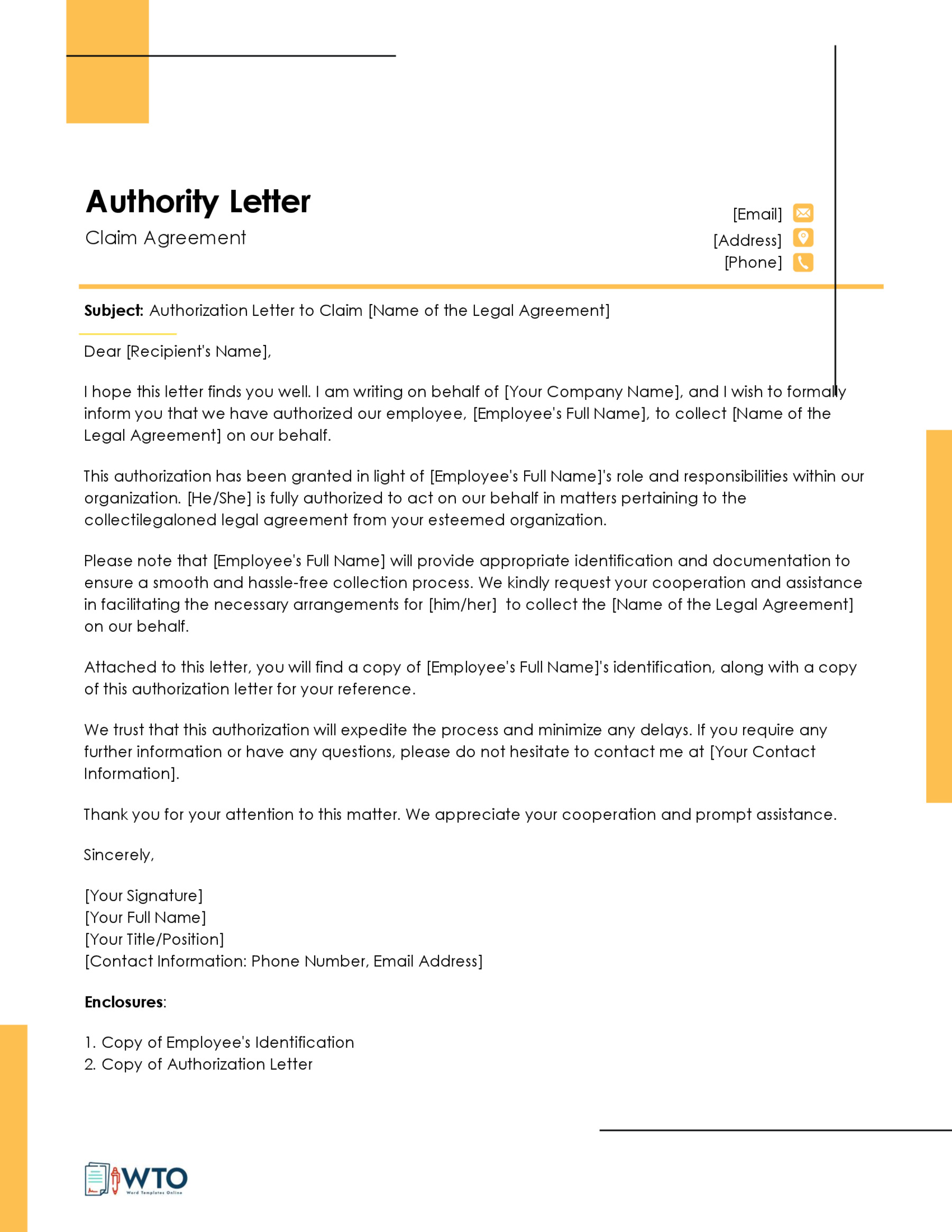
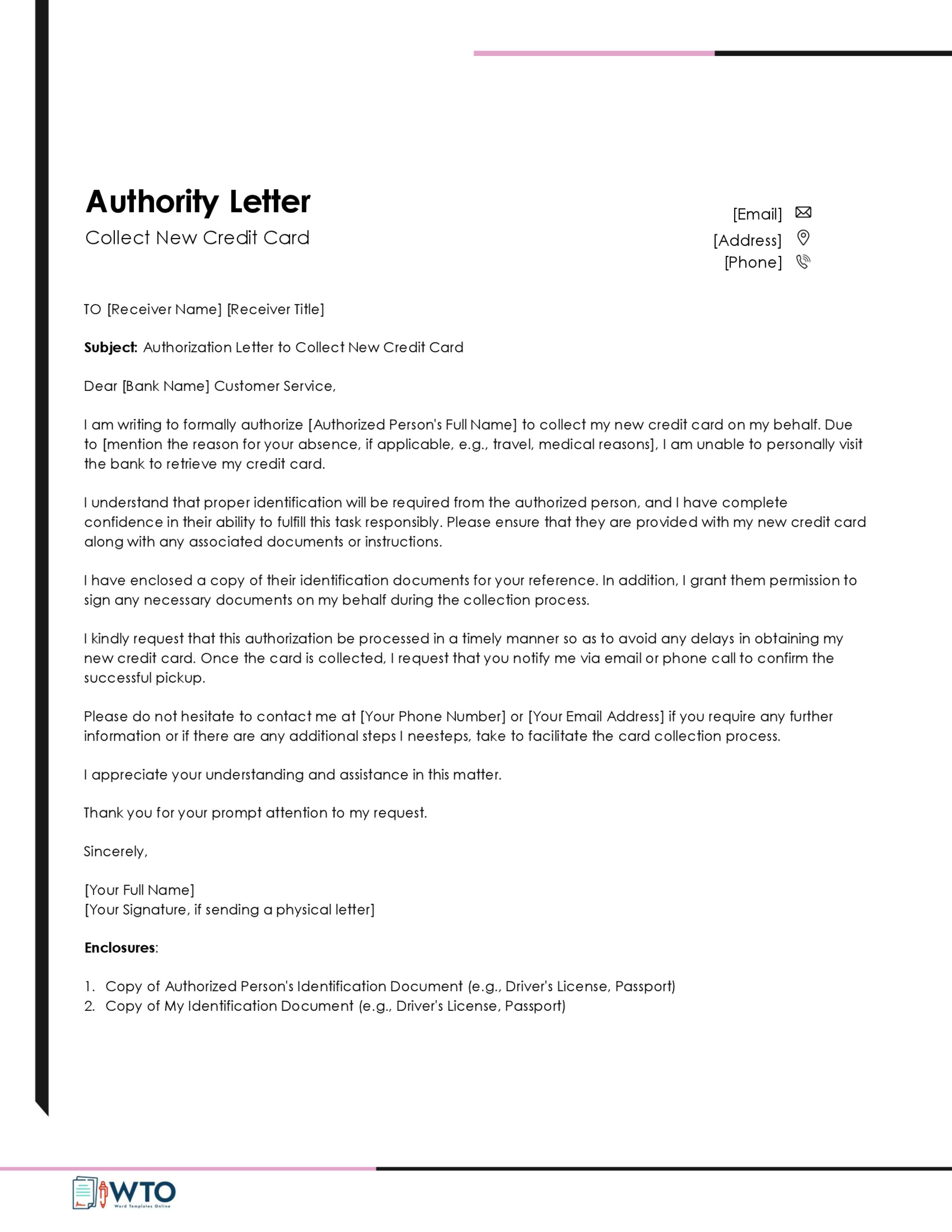
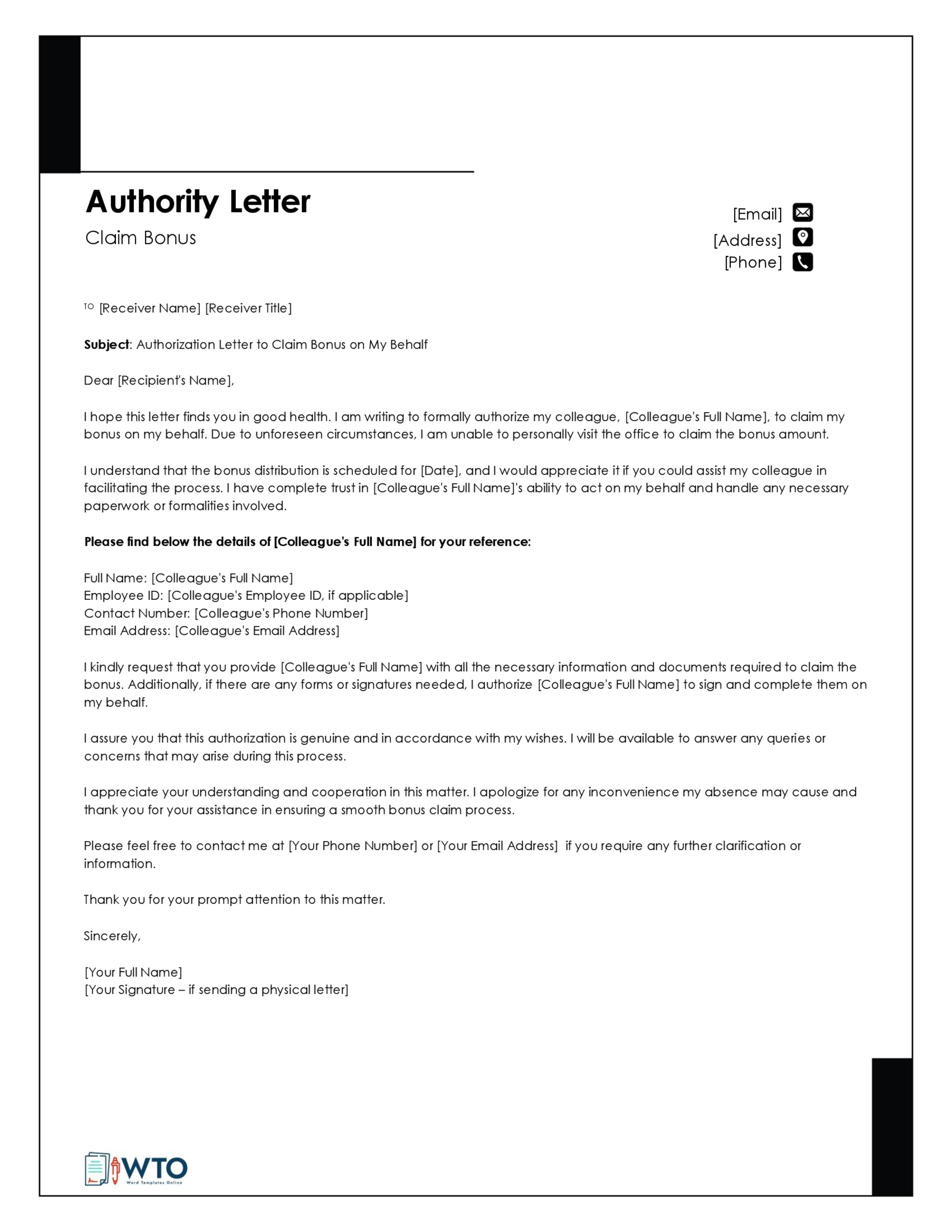
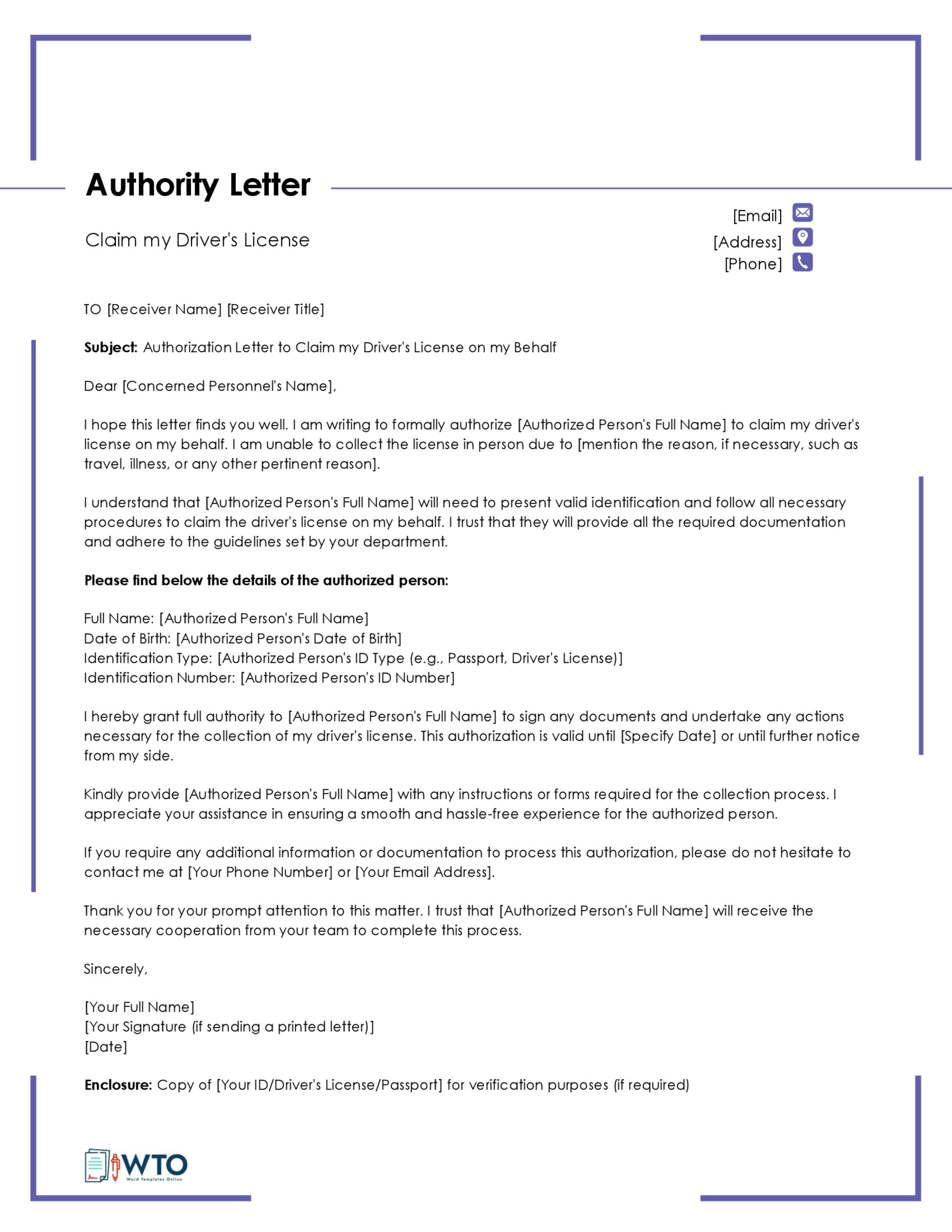
Writing an Authorization Letter to Claim: Step-by-Step Guide
This letter will typically identify the parties involved, grant authorization, and specify the purpose of the permission. While these are generic components, the specific content and format of this letter can vary based on local laws, regulations, and the requirements of the organization you are dealing with.
Below is a comprehensive step-by-step guide detailing the fundamental elements of this letter:
The header sets the tone for the letter and establishes the context in which the authorization is being granted. It ensures clarity and professionalism right from the beginning. It serves as the introductory section that provides essential details about the letter, including the sender’s information, the recipient’s information, and the date of writing. The following information should be presented in the header;
Your details
You should provide your identification information. This includes your full name, primary mailing address, valid email address, and phone number. This information helps identify who is sending the letter and facilitates communication.
EXAMPLE
Hugo Hernandez
55 Melbourne Street
Albuquerque, UT 9390
Hugo3hernandez@email.com
(444) 3674-0001
Date
The date should appear beneath your information. It should indicate the day, month, and year.
EXAMPLE
August 18, 20XX
Recipient’s information
Below the date, specify the personal details of the recipient. Indicate their official name, designation (if applicable), institution name, and address. This information ensures that the letter reaches the intended audience.
EXAMPLE
James Weaving
Branch Manager
Border Immigration Offices
155 West End Avenue
Crenshaw, TX, 05331
Step 2: Write a polite salutation
A polite salutation is important to maintain a professional and courteous tone. A common salutation is “Dear [Authorized Person’s Name],” followed by a comma. If you are unsure of the person’s name, you can use a more general salutation like “To Whom It May Concern,” though it is always better to address them by name if possible.
EXAMPLE
Dear Mr. Weaving,
Step 3: Explain your situation
In this step, you will want to provide a concise explanation of why you are unable to handle the matter personally and why you are entrusting the authorized person to claim the document on your behalf. Be clear and straightforward in your explanation.
EXAMPLE
I am writing this letter to authorize Havi Santos to claim my passport on my behalf from the immigration office, as I am away for business and thus unable to collect the document myself.
Step 4: Describe the item
Provide precise information about the item that the authorized person will be claiming on your behalf. You can mention a unique reference number, date, model, year, serial number, etc. The goal is to provide all the necessary information so that the authorized person can easily locate and claim the item. This helps ensure clarity and prevents any confusion regarding the extent of their authorization.
EXAMPLE
My passport details are as follows;
Passport Name: Hugo Miguel Hernandez
Date issued: August 01, 2023
Reference No: US-308922-TX08
Step 5: Specify the authorized person
Next, provide an explicit authorization statement that specifies the authorized person’s identity and the function(s) they are to undertake. Use up-to-date and accurate information. This is crucial to ensure that there is no confusion about who has the authority to claim the item or perform the task. Also, you can attach copies of your identification in this section if proof of identity is needed to verify the authorization.
EXAMPLE
I hereby authorize Havi Santos, a resident at 33 St. Tropez, Jacksonville County, TX 1234, to claim my passport, with reference number US-308922-TX08, from Border Immigration Offices, Texas.
Copies of my and his government-issued identification cards have been attached to facilitate the identity verification process.
Step 6: Set the duration and conditions
Indicate the duration within which the authority will be valid. The authorization can be limited to a few days, for a single use, indefinite until revoked, or subject to further notice. Also, outline any instructions the agent must adhere to while fulfilling their duties. Setting the duration and conditions of the authorization is an important step in defining the scope and limitations of the agent’s actions. This helps avoid any misunderstandings and ensures that the authorization is used only for its intended purpose.
EXAMPLE
This authorization is limited to the sole purpose of claiming the aforementioned item and does not extend to any other transactions. This authorization is valid until September 18, 2023, after which it will no longer be effective.
Step 7: Express gratitude
Expressing gratitude in a letter is a courteous way to acknowledge the recipient’s assistance and cooperation. This statement reaffirms your confidence in the recipient’s ability to assist and conveys your expectation for a successful outcome. Also, it adds a personal touch and reinforces a positive tone throughout the letter.
EXAMPLE
I am deeply grateful for your assistance in this matter.
Step 8: Provide contact information
Next, provide your contact information (phone number and active email address) in case the recipient needs to reach you for any clarifications, questions, or concerns. This information adds an extra layer of transparency and communication.
EXAMPLE
For any correspondence for clarifications or any other purpose, contact me at (444) 6700-1182 or hugo3hernandez@email.com.
Step 9: End professionally
Close the letter with a formal closing (e.g., “Sincerely” or “Yours faithfully”) followed by your full legal name. If sending a physical letter, include a handwritten signature; an email only requires your typed name. Make sure your signature matches your identification documents.
EXAMPLE
Sincerely,
[Your Signature, if sending a physical letter]
Hugo Hernandez
note
Optionally, provide additional identification details, such as your passport or driver’s license number, by attaching copies. This is dependent on the legal requirements of your jurisdiction and the receiving party’s policies. This step is meant to add an extra layer of legitimacy to the authorization.
Authorization Letter to Claim Documents Template
[Your Full Name]
[Your Address]
[City, State, Zip Code]
[Email Address]
[Phone Number]
[Date]
[Recipient’s Full Name]
[Their Title/Position, if applicable]
[Company/Organization Name]
[Company/Organization Address]
[City, State, Zip Code]
Subject: Authorization to Claim Documents
Dear [Recipient’s Full Name or “To Whom It May Concern”],
I, [Your Full Name], hereby authorize [Authorized Person’s Full Name], holding identification number [ID Number] and contact number [Authorized Person’s Phone Number], to act on my behalf in all manners relating to the claiming of documents, including but not limited to [specific documents, e.g., academic records, employment documents, legal paperwork].
This authorization includes the collection of documents from [Location/Department, if applicable] and the signing of any documents required to release these documents to [Authorized Person’s Full Name]. I understand that the process may require [Authorized Person’s Full Name] to provide identification and this letter as proof of authorization.
Please find attached a photocopy of my identification [Specify ID, e.g., driver’s license, passport] and [Authorized Person’s Full Name]’s identification for verification purposes.
This authorization is valid from [Start Date] until [End Date], unless otherwise revoked in writing prior to the end date.
I appreciate your full cooperation in allowing [Authorized Person’s Full Name] to claim the aforementioned documents on my behalf. Should you require any further information or clarification, please do not hesitate to contact me directly at [Your Phone Number] or via email at [Your Email Address].
Thank you for your attention to this matter.
Sincerely,
[Your Signature]
[Your Printed Name]
Analysis
This authorization letter effectively grants permission to a designated individual to collect documents on behalf of the writer. The clarity of the letter is one of its strengths, with the purpose and scope of the authorization explicitly stated in the opening lines. Including specific details such as the date of collection, the type of documents, and the identification numbers of both parties involved enhances the credibility and specificity of the authorization.
Another strong point is the provision for verification through the attachment of identification copies and the requirement for the authorized individual to present their original ID, addressing potential security concerns. The letter also maintains a formal and polite tone, appropriate for official communications. However, while the letter is comprehensive, incorporating a specific instruction or clause about handling discrepancies or questions might have added value, ensuring a smoother process if any issues arise during the document collection.
Overall, the letter serves as a clear, concise, and formal authorization for document collection, demonstrating an understanding of the necessary elements to facilitate this process securely and efficiently.
Most Common Types of an Authorization Letter to Claim
These letters can cover a variety of situations and items. Therefore, it is important to tailor it to the specific context. With that in mind, here are some of its most common types:
Authorization letter to collect passport
This document awards someone else the authority to collect your passport on your behalf from a designated passport office or embassy. It outlines your inability to personally retrieve the passport due to various reasons, such as travel constraints, work commitments, or health issues. It ensures that your passport is collected securely and legally by an individual you trust, allowing for a smooth and convenient process.
Authorization letter to collect passport
This document awards someone else the authority to collect your passport on your behalf from a designated passport office or embassy. It outlines your inability to personally retrieve the passport due to various reasons, such as travel constraints, work commitments, or health issues. It ensures that your passport is collected securely and legally by an individual you trust, allowing for a smooth and convenient process.
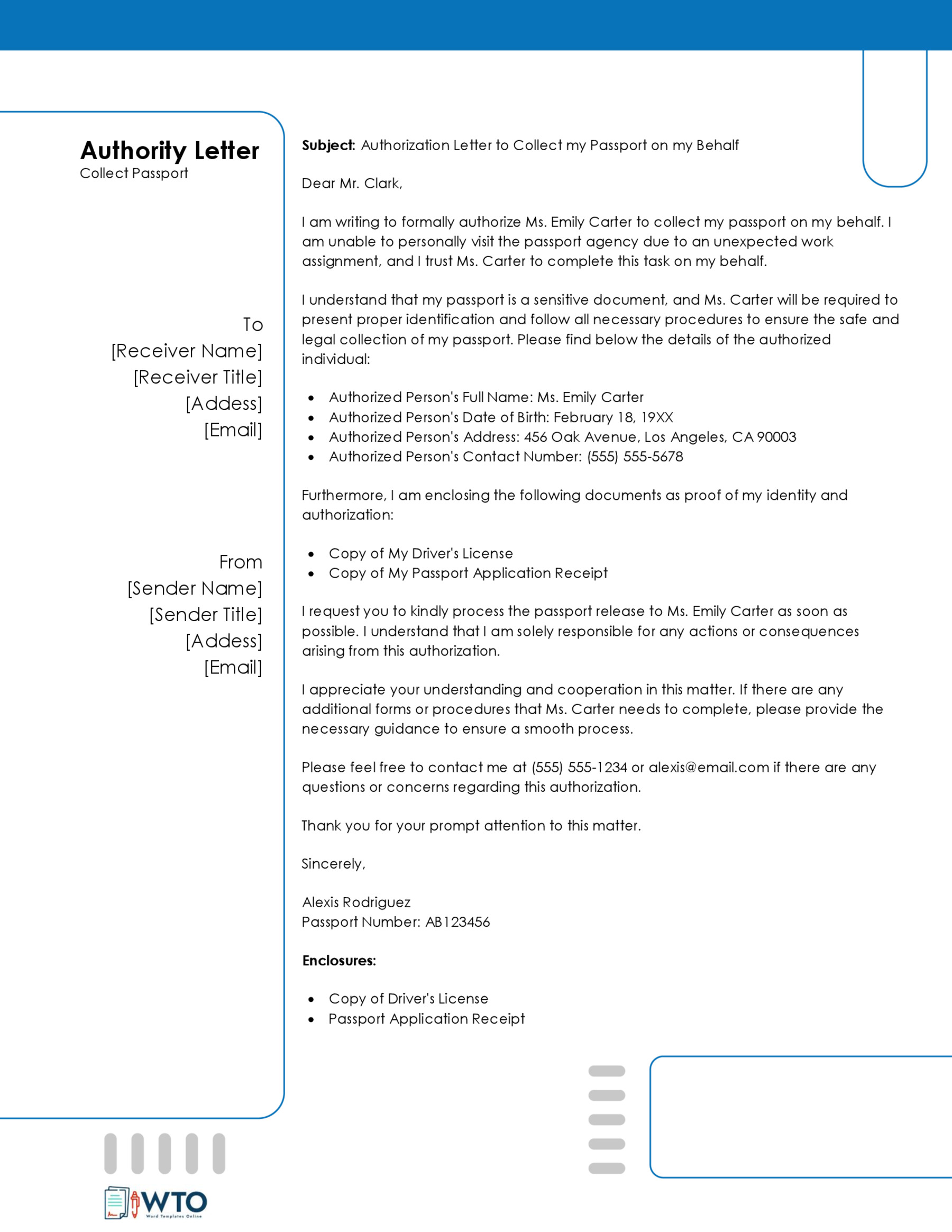
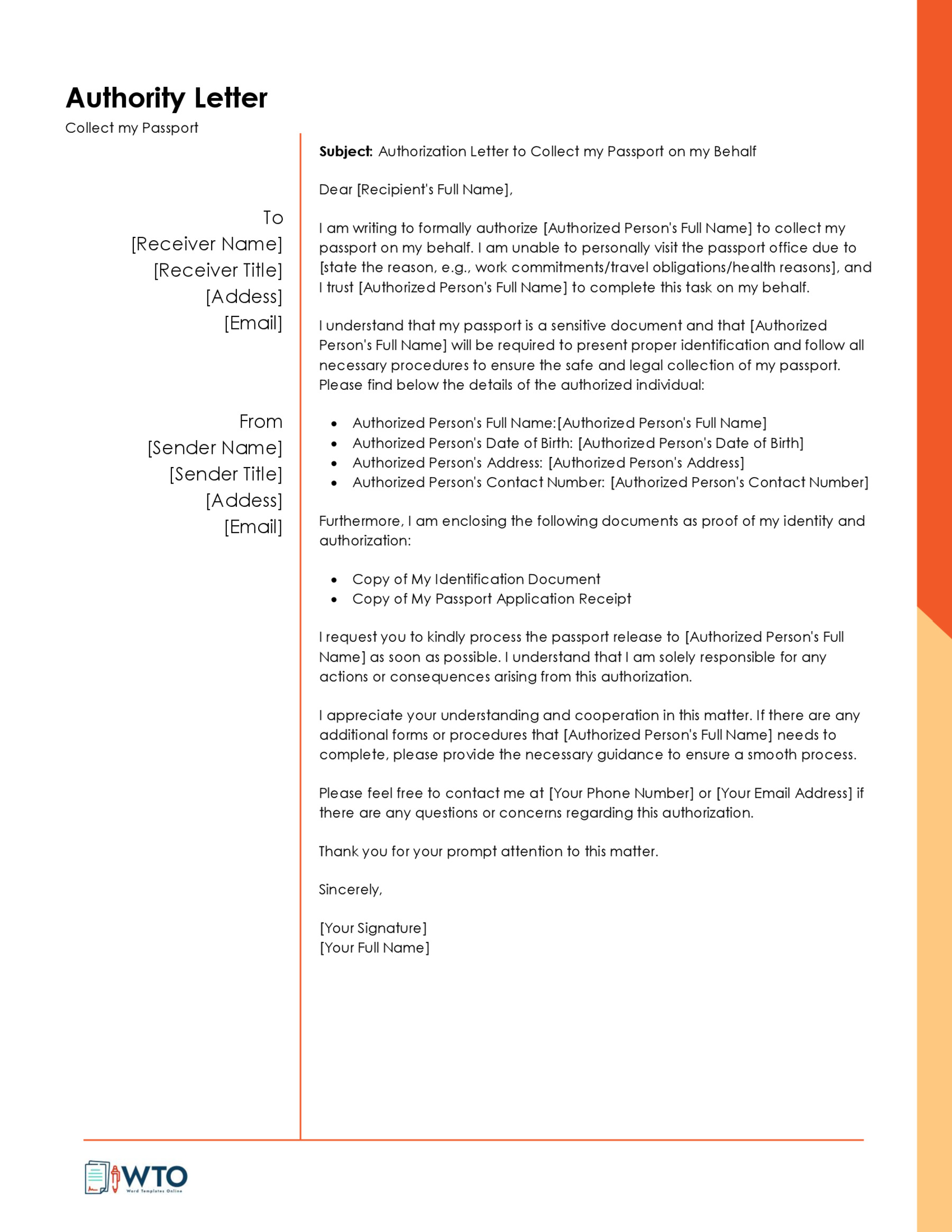
Authorization letter to claim birth certificate
In it, you designate a second party to claim your birth certificate on your behalf. The letter should state your reasons for not being able to collect the birth certificate personally, which could include time constraints, distance, or other commitments.
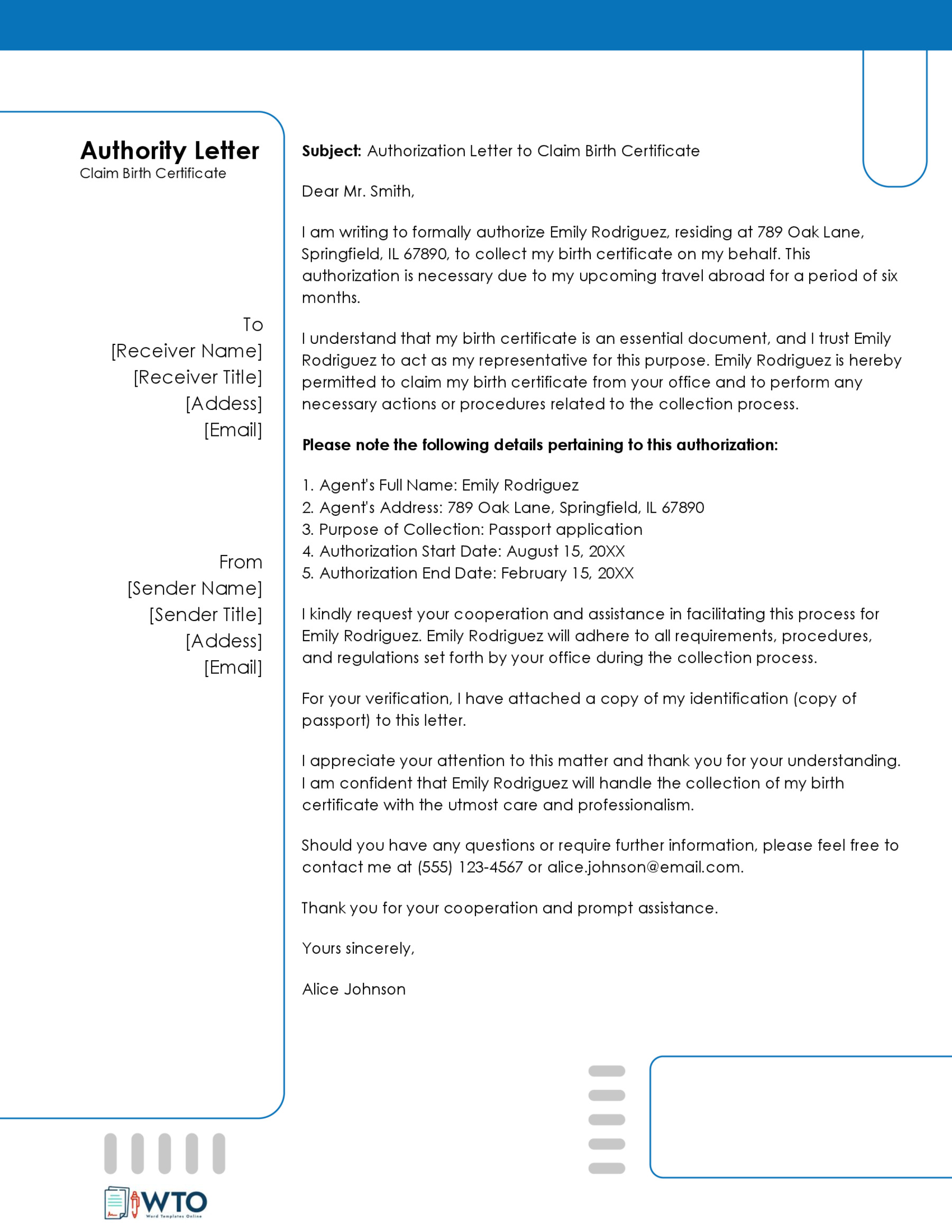
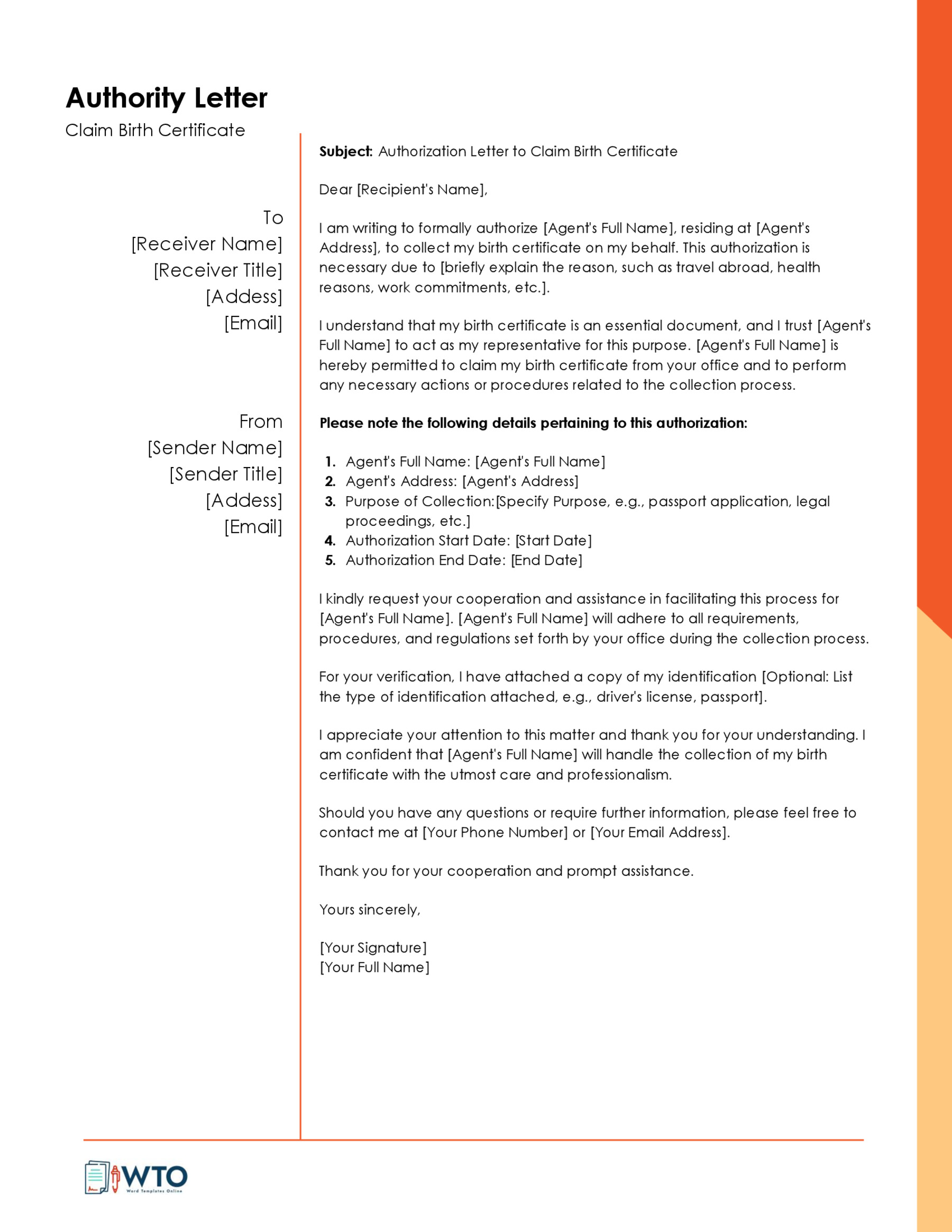
Authorization letter to collect documents from the bank
In situations where you cannot be present to access your bank or financial records, this letter can grant someone access to these documents. It must specify the type of financial documents the agent is allowed to access, the timeframe for which the authorization is effective, and any conditions for document retrieval.
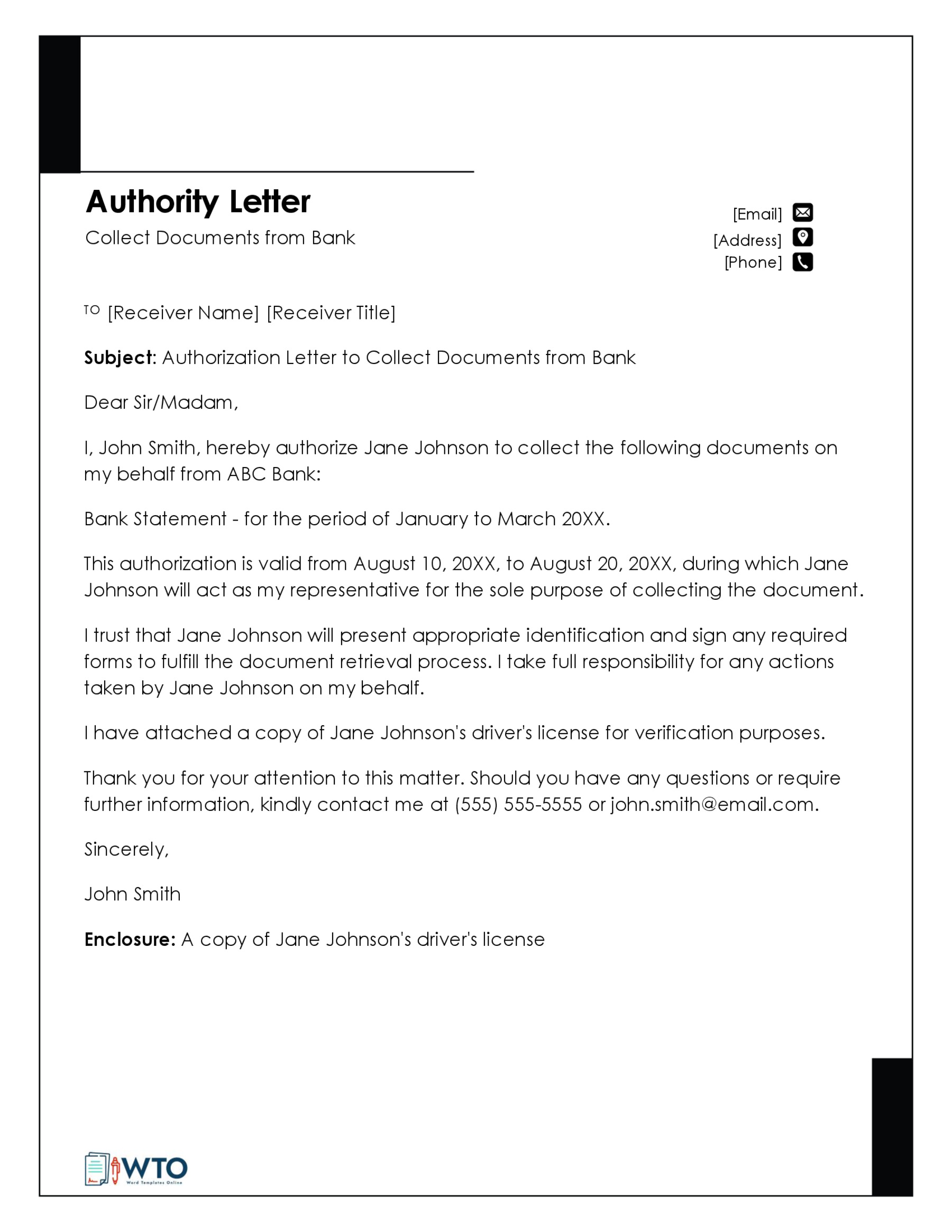
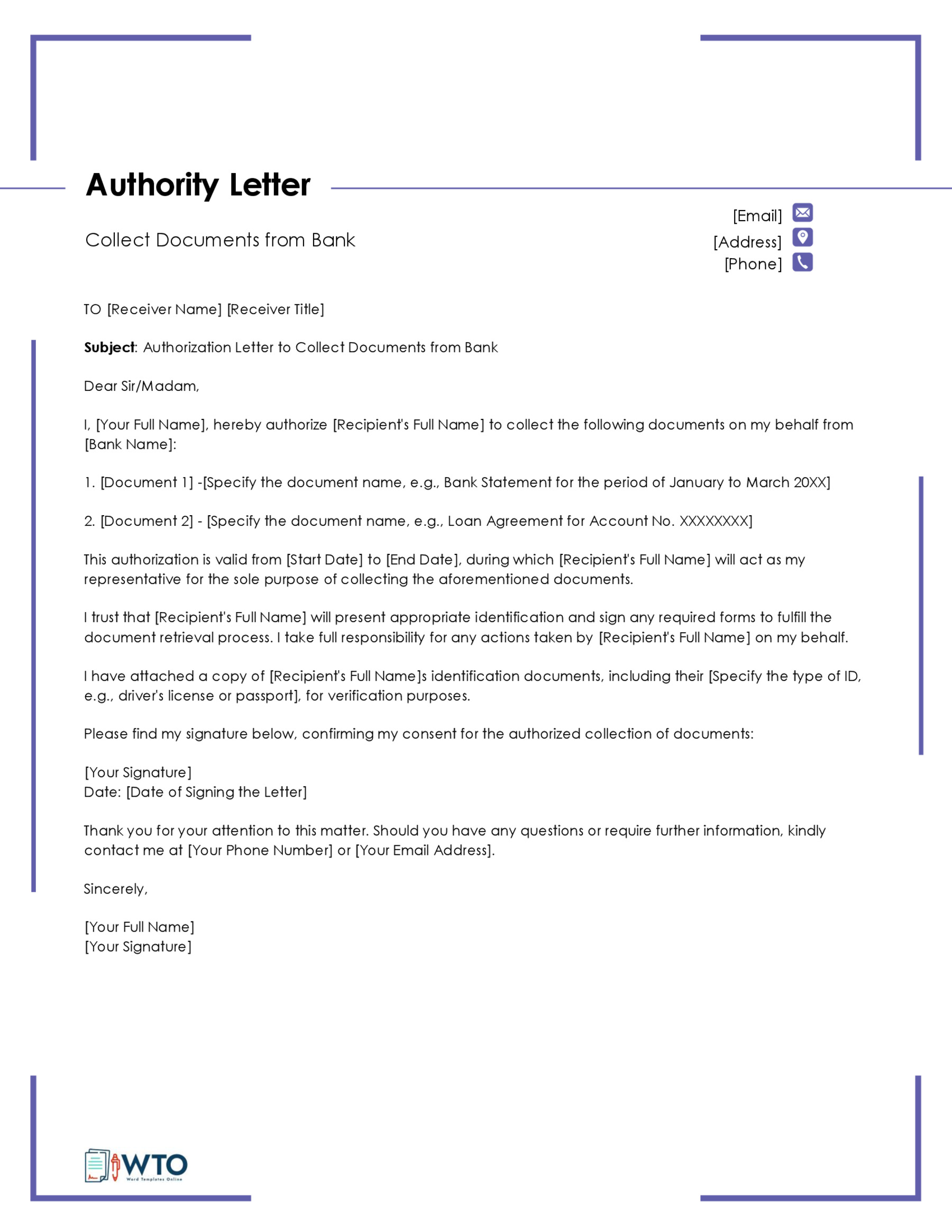
Authorization letter for checkbook pickup
This letter permits someone else to collect a new checkbook on your behalf from a bank or financial institution. It must indicate the representative’s details, the reason for the authorization, and any identity verification requirements applicable.
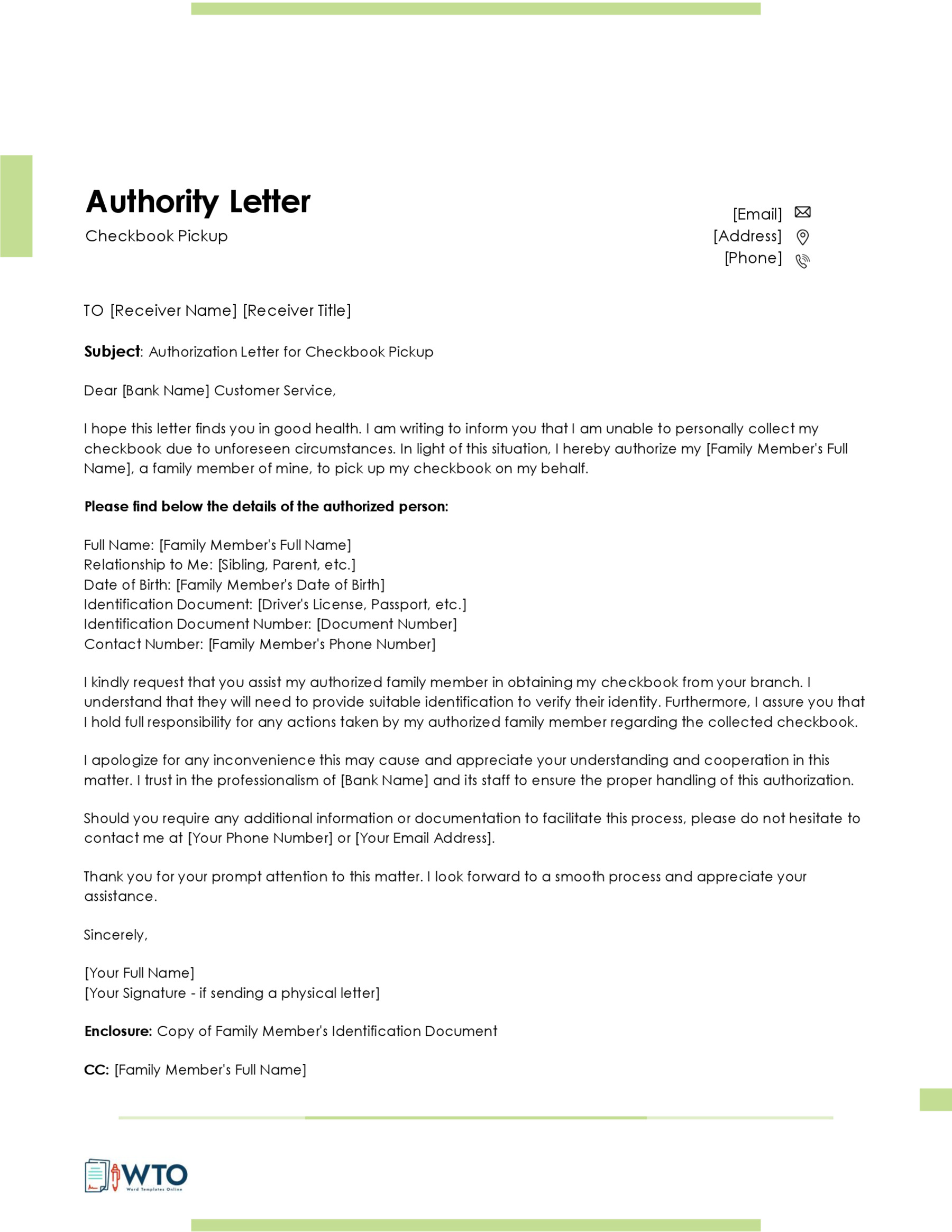
Authorization letter to collect salary
This document allows a trusted individual to retrieve your salary payment on your behalf from your employer. The letter explains why you cannot personally receive your salary, which could include travel, illness, or other commitments. It must also identify the authorized person’s identity and relevant payment details or procedures.
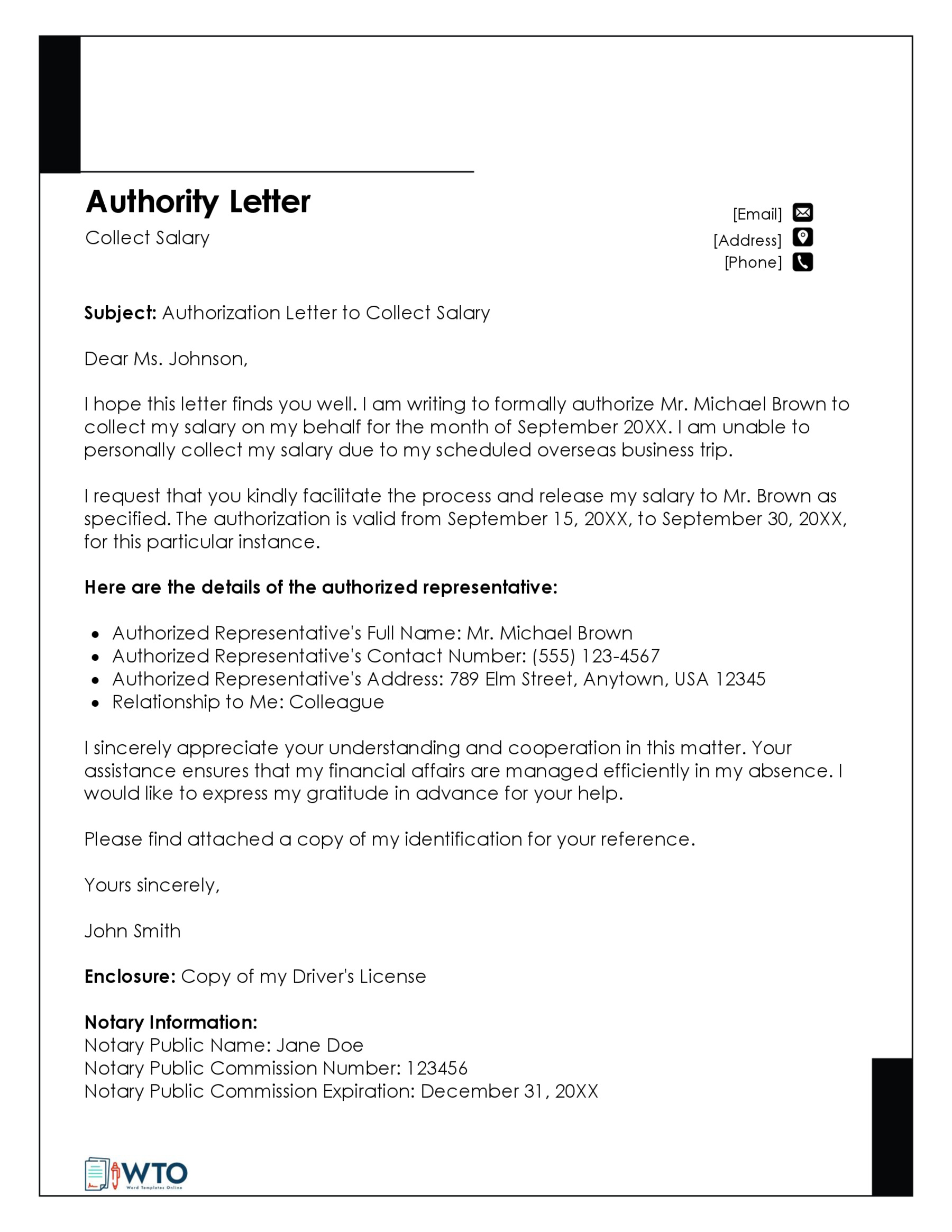
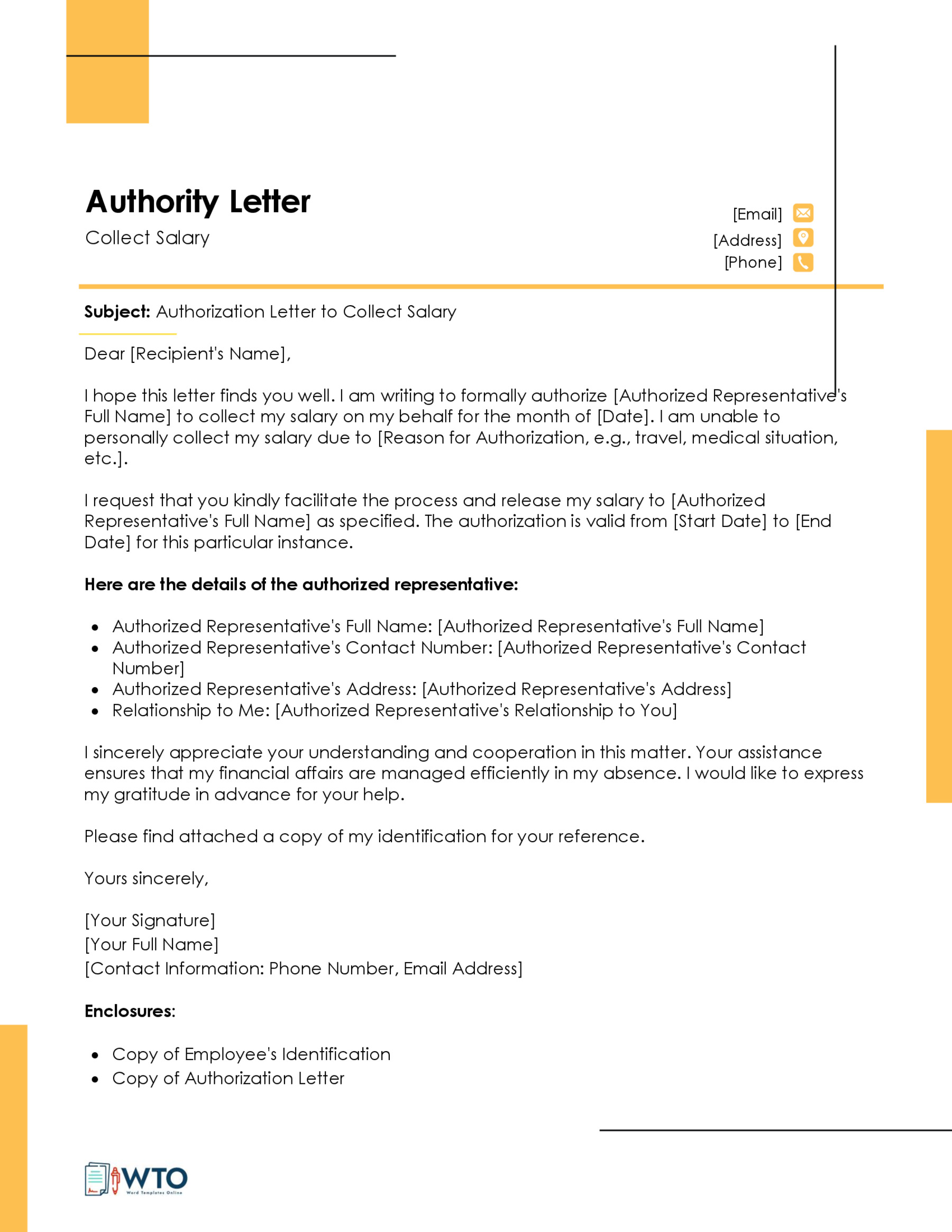
Authorization letter to collect bank statement
It empowers a trusted individual to access your bank statements for various financial and record-keeping purposes on your behalf. The letter should define the scope and limitations of access to and use of bank statements to protect sensitive personal and financial data. It must also clearly identify the appointed representative to avoid unauthorized access through deception.
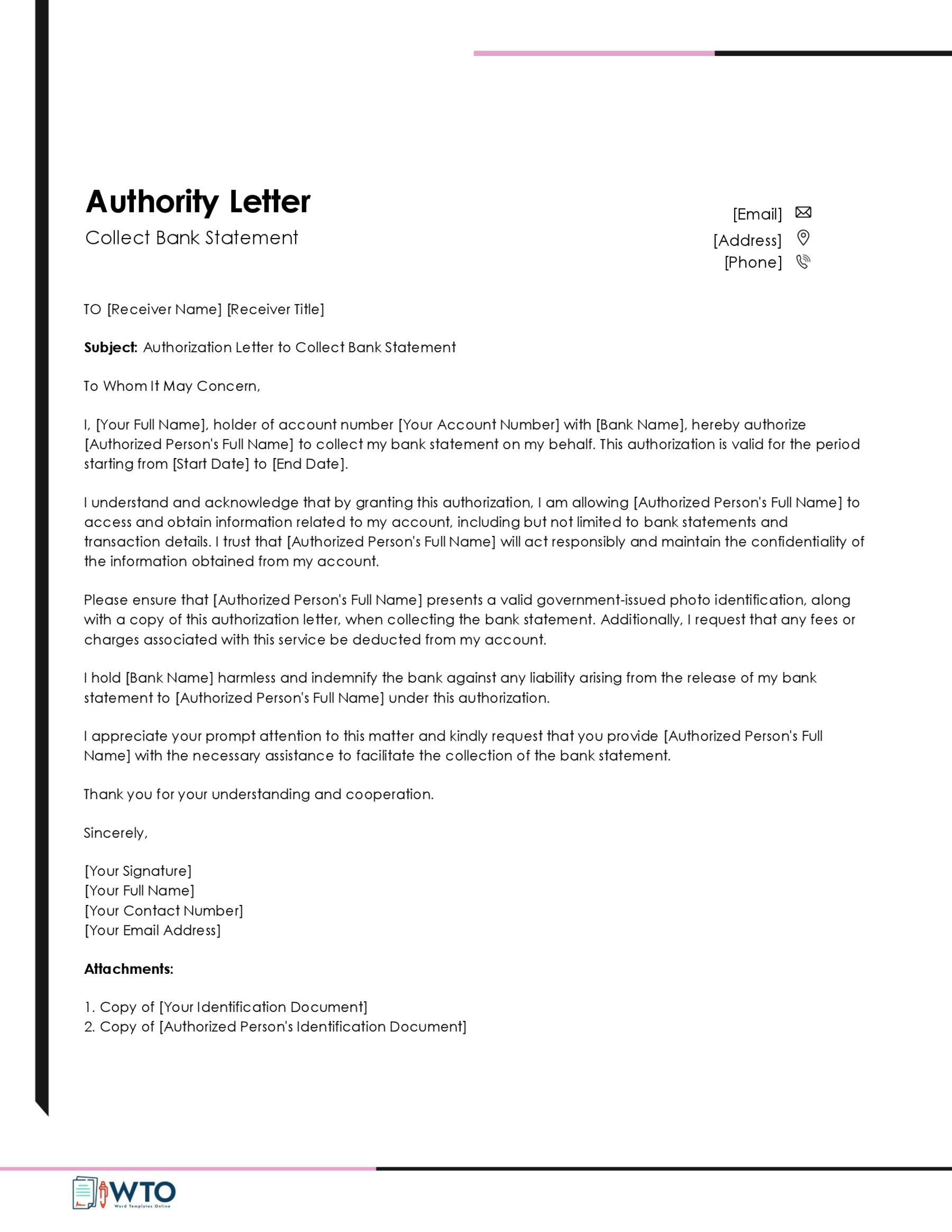
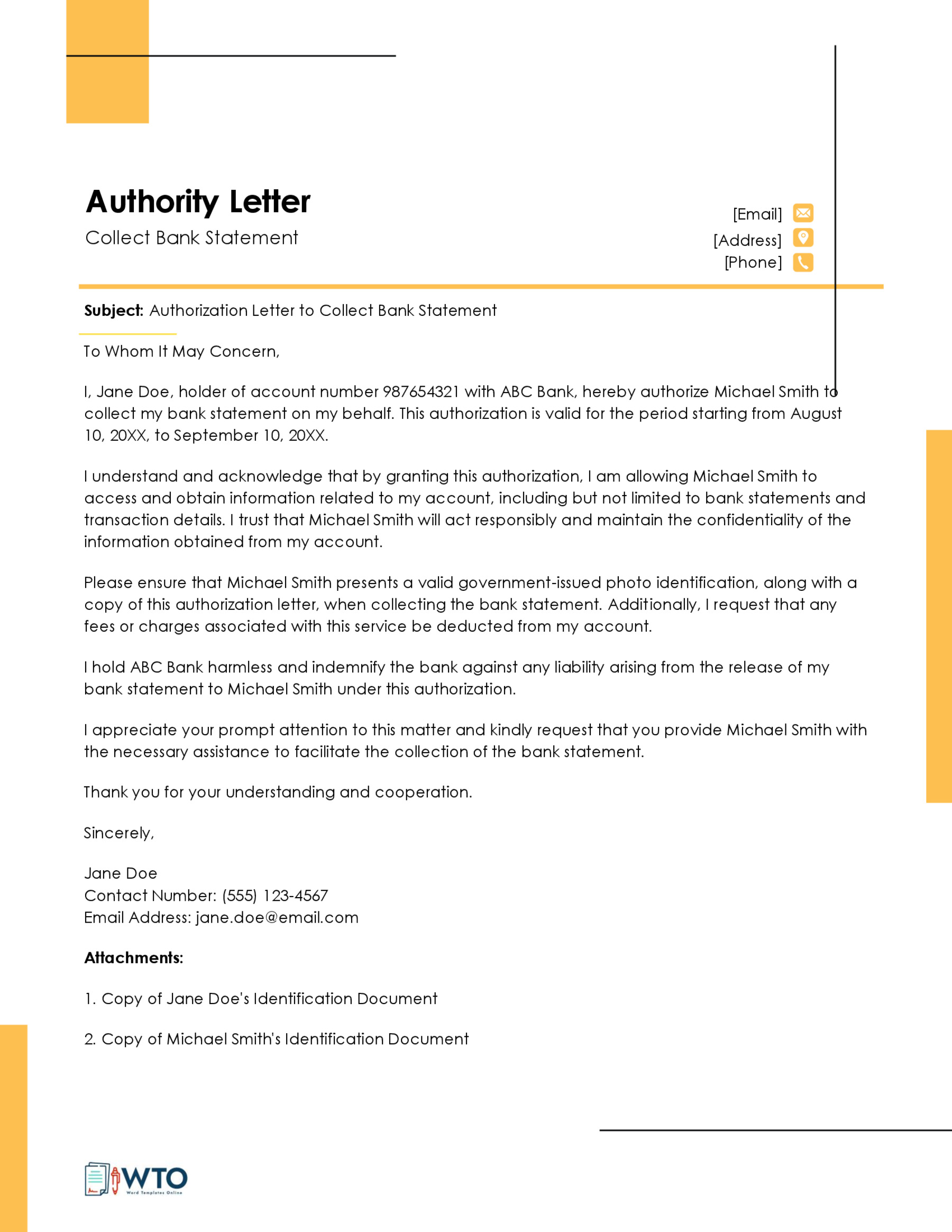
Final Thoughts
In summary, this letter serves as a formal document granting someone else the authority to act on your behalf and retrieve specific items or documents in various situations. Whether collecting a passport, accessing bank statements, claiming a birth certificate, or handling financial matters, it provides a legal and structured way to delegate responsibilities. By following the step-by-step guide in this article, you can ensure that your letter is clear, professional, and compliant with legal requirements. Remember that while the specific content and format may vary depending on the situation and local regulations, the core elements remain consistent: stating the purpose, designating the authorized agent, setting the scope and duration, and expressing gratitude. Lastly, crafting a well-structured authorization letter ensures a smooth and secure process for the authorized individual while maintaining your control and privacy over the claimed items or documents.


